Are you looking to shed a few pounds and boost your overall health? Detox teas may be just the natural solution you need. These specially formulated brews are packed with ingredients that can help increase your metabolism, burn fat, flush out toxins, and support weight loss. In this article, we will explore the 24 detox slimming teas to help you slim down. From well-known options like green tea to lesser-known varieties like nettle tea, we will delve into the unique properties of each tea and how they contribute to weight management.
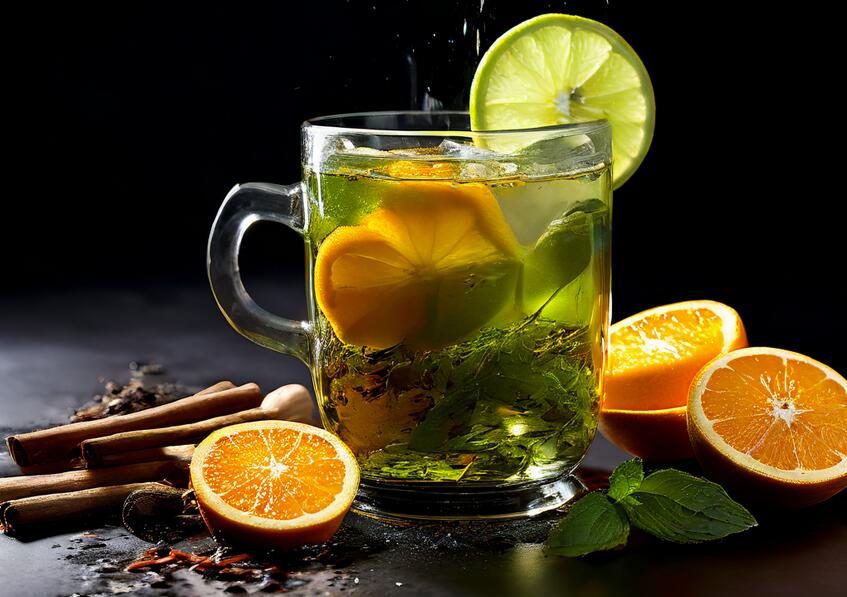
24 Best Detox Teas to Help You Slim Down Naturally
If you’re ready to harness the power of detox teas for your weight loss goals, here are the 24 best varieties to try:
1. Green Tea
Green tea is the most well-known and researched detox tea for weight loss. It’s made from the unoxidized leaves of the Camellia sinensis plant. In addition, it is minimally processed, allowing it to retain a high concentration of catechins, particularly EGCG.
One study found that participants who consumed green tea extract for 12 weeks lost an average of 2.9 pounds more than the control group.
To get the most benefits, opt for high-quality loose-leaf green tea and steep for 3-5 minutes in hot water. You can drink it plain or add a slice of lemon for an extra antioxidant boost. Aim for 3-5 cups per day for maximum results.
2. Matcha Green Tea
Matcha is a powdered form of green tea that’s even more potent than the leaf variety. Because you consume the whole leaf, you get a concentrated dose of catechins and other beneficial compounds. One study found that drinking matcha before exercise increased fat burning by 17%.
Matcha also contains L-theanine, an amino acid that can promote relaxation and improve brain function. To prepare, sift 1-2 teaspoons of matcha powder into a cup, add hot water, and whisk until smooth and frothy. Enjoy plain or add a touch of honey. For an extra boost, you can try adding matcha to smoothies or oatmeal.
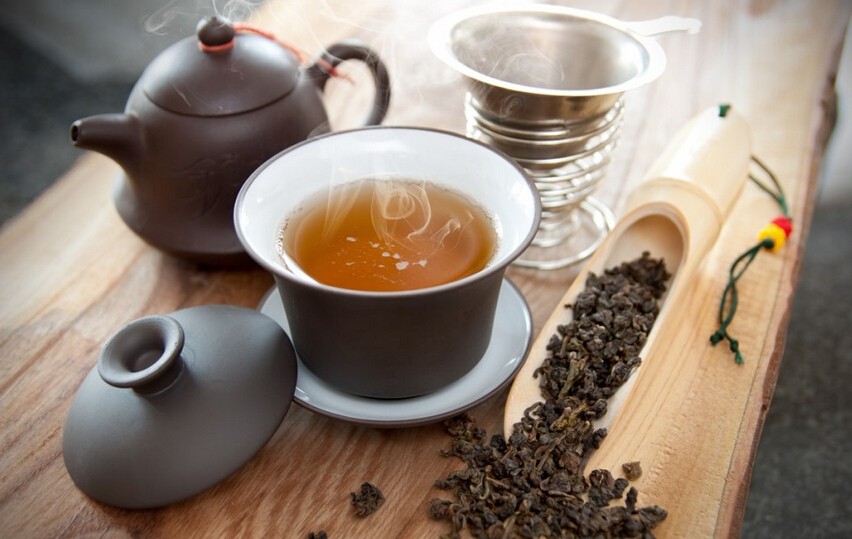
3. Oolong Tea
Oolong tea is a traditional Chinese tea that’s partially oxidized. This gives it a flavor between green and black tea. Like green tea, oolong is rich in catechins that can boost fat burning.
In addition, the partial oxidation also produces unique polyphenols that may further enhance its weight loss potential.
Studies have found that oolong tea can help decrease body weight, body fat, and waist size. To brew, steep 1-2 teaspoons of loose leaf oolong in hot water for 2-5 minutes. You can re-steep the leaves multiple times to extract more flavor and nutrients.
4. Black Tea
Black tea is fully oxidized, which gives it a bold flavor and higher caffeine content than green or oolong teas. While it may have fewer catechins, black tea is still a good choice for weight loss thanks to its caffeine content. This can increase energy expenditure and fat burning.
Black tea also contains unique polyphenols called theaflavins and thearubigins that may have additional fat-burning effects. Choose high-quality, loose-leaf black teas like Ceylon or Assam. Then steep in freshly boiled water for 3-5 minutes. Enjoy plain or with a splash of milk.
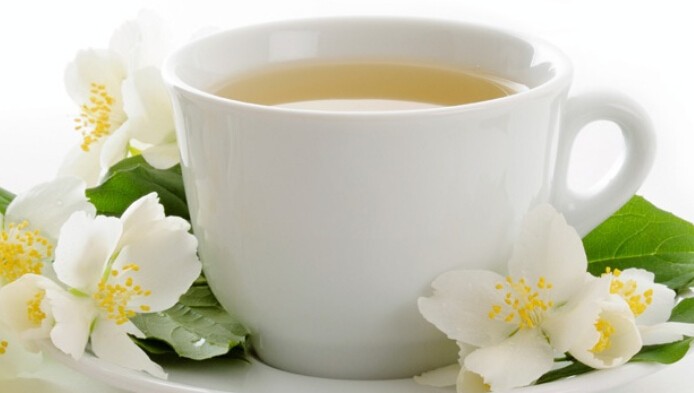
5. White Tea
White tea is the least processed true tea. It’s made from young buds and leaves that are minimally oxidized, preserving their delicate flavor and high antioxidant content.
Some research suggests white tea may be even more effective than green tea at boosting metabolism and preventing fat cell formation.
To brew white tea, use water that is just below boiling and steep 1-2 teaspoons of loose-leaf tea for 1-3 minutes. Be careful not to over-steep, as this can result in a bitter taste. White tea is best enjoyed plain to appreciate its subtle flavor.
6. Pu-erh Tea
Pu-erh is a fermented tea that originates from China’s Yunnan province. The unique aging process gives pu-erh a deep, earthy flavor and potential weight loss benefits. Studies show that pu-erh tea may help reduce body weight, body fat, and belly fat accumulation.
Pu-erh’s weight loss effects may be due to its ability to increase fat breakdown, block fat absorption, and boost metabolism. For best results, drink a cup of pu-erh tea one hour after meals. Steep the aged leaves in boiling water for 30 seconds to 2 minutes. You can re-steep the leaves multiple times.
7. Rooibos Tea
Rooibos is a caffeine-free herbal tea made from the South African red bush. It has a smooth, nutty flavor and is rich in antioxidants like aspalathin, which may help reduce stress hormones that trigger hunger and fat storage. This makes rooibos a great choice for those looking to manage weight without caffeine.
Rooibos is also a good source of antioxidants that support heart health and balanced blood sugar. To prepare, steep 1-2 teaspoons of loose leaf rooibos in boiling water for 5-10 minutes. Enjoy plain or with a splash of milk and honey. Rooibos is also delicious iced.
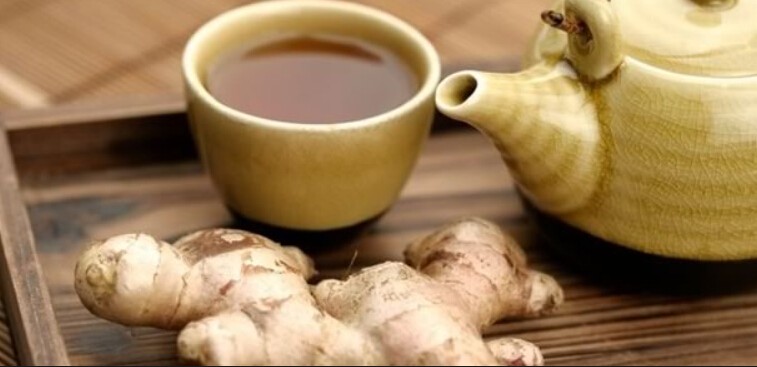
8. Ginger Tea
Ginger is a spicy root known for its ability to aid digestion, reduce inflammation, and boost metabolism. This tea has thermogenic properties that can increase the body’s heat production and calorie-burning potential. It may also help reduce hunger and promote feelings of fullness.
To make ginger tea, steep fresh ginger slices in hot water for 5-10 minutes. You can add other metabolism-boosting ingredients like lemon or cayenne pepper for an extra kick. Ginger tea is naturally caffeine-free, so you can enjoy it any time of day.
9. Hibiscus Tea
Hibiscus is a vibrant red herbal tea made from the dried petals of the hibiscus flower. It has a tart, cranberry-like flavor and is packed with antioxidants like anthocyanins.
Hibiscus tea is also a natural diuretic that can help flush out excess water and reduce bloating. To make hibiscus tea, steep 1-2 teaspoons of dried flowers in boiling water for 5-10 minutes. Enjoy hot or iced with a touch of honey or lime juice.
10. Dandelion Root Tea
Dandelion root tea is made from the roasted roots of the dandelion plant. It has a rich, earthy flavor similar to coffee. Dandelion root is a natural diuretic that can help reduce water weight and bloating. It’s also rich in potassium, which helps regulate fluid balance.
Dandelion may also support liver function and aid in detoxification. To make dandelion tea, steep 1-2 teaspoons of roasted dandelion root in hot water for 10-15 minutes. You can find roasted dandelion root at health food stores or online.
11. Yerba Mate
Yerba mate is a traditional South American herbal tea made from the leaves of the holly tree. It has an earthy flavor and contains caffeine, theophylline, and theobromine. These work together to provide a sustained energy boost. Yerba mate may also increase metabolism and fat burning, especially during exercise.
To prepare yerba mate, steep 1-2 teaspoons of loose-leaf tea in hot water for 3-5 minutes. Enjoy plain or with a slice of lemon. Yerba mate does contain caffeine, so it’s best consumed in moderation.
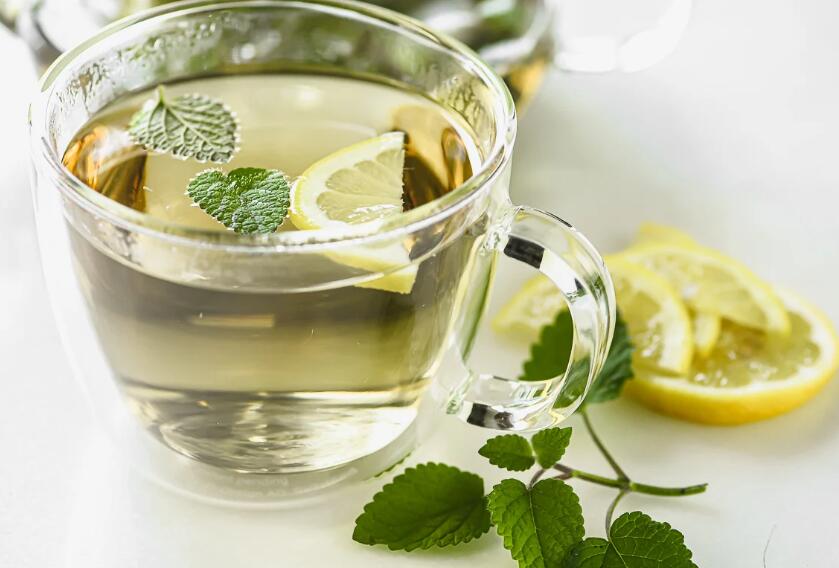
12. Lemon Balm Tea
Lemon balm is an aromatic herb in the mint family with a mild, lemony scent. It contains compounds that may help reduce inflammation and balance blood sugar levels. High blood sugar can lead to increased fat storage and cravings, so keeping it stable is important for weight management.
Lemon balm tea is also known for its calming effects and may help reduce stress. To make lemon balm tea, steep 1-2 teaspoons of dried leaves in hot water for 5-10 minutes. Enjoy plain or with honey. Lemon balm is caffeine-free and safe to drink in large quantities.
13. Rose Tea
Rose tea is made from the fragrant petals of the rose flower. It has a delicate floral flavor and is rich in polyphenol antioxidants. One animal study found that rose tea extract prevented weight gain and reduced body fat in mice on a high-fat diet.
Rose tea is also a mild natural laxative that can promote regularity and relieve constipation. To make rose tea, steep 1-2 teaspoons of dried rose petals in hot water for 5-10 minutes. Rose tea is naturally sweet and caffeine-free.
14. Fennel Tea
Fennel is a flowering plant with a sweet, licorice-like flavor. The seeds are commonly used in cooking and herbal teas to aid digestion and reduce bloating. Fennel tea is a potent digestive aid that can help relieve gas, cramps, and constipation.
Fennel tea may also help suppress appetite and boost metabolism thanks to its volatile oils. To make fennel tea, lightly crush 1-2 teaspoons of fennel seeds and steep in hot water for 10-15 minutes. Fennel tea is caffeine-free but may interact with certain medications.
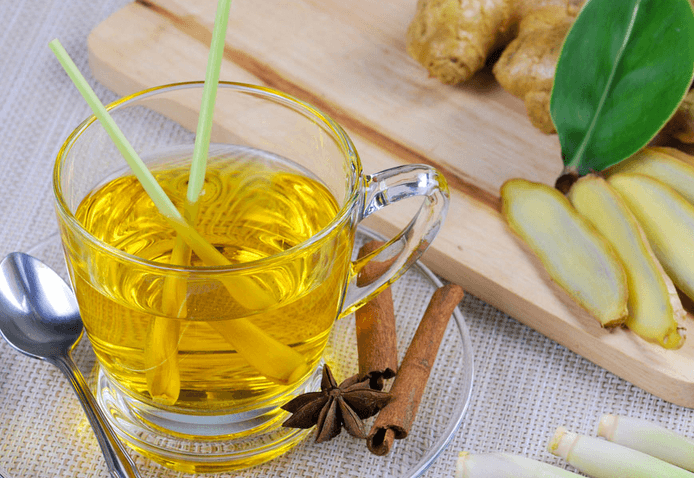
15. Lemongrass Tea
Lemongrass is a tropical plant with a fresh, citrusy aroma. It’s commonly used in Southeast Asian cuisine and herbal medicine. Lemongrass tea is a natural diuretic that can help reduce water retention and bloating.
Lemongrass also contains compounds that may boost metabolism and increase fat burning. To make lemongrass tea, steep 1-2 teaspoons of dried leaves or a few fresh stalks in hot water for 5-10 minutes. Enjoy plain or with honey or ginger. Lemongrass is caffeine-free.
16. Peppermint Tea
Peppermint is a refreshing herb known for its cooling, invigorating flavor. It’s often used to soothe digestive issues like bloating and indigestion. The menthol in peppermint has a numbing effect that may also help suppress appetite.
Peppermint tea is naturally caffeine-free, making it a great choice for a post-meal digestive or bedtime relaxation tea. To make peppermint tea, steep 1-2 teaspoons of dried leaves or a few fresh sprigs in hot water for 5-10 minutes. Enjoy plain or with honey.

17. Chamomile Tea
Chamomile is a soothing herb with a mild, slightly sweet flavor. It’s well-known for its calming effects and ability to promote relaxation and better sleep. But chamomile tea may also have benefits for weight loss.
Chamomile contains an antioxidant called apigenin. This can help reduce inflammation and may help regulate blood sugar levels. Balanced blood sugar is important for controlling cravings and preventing overeating. Chamomile tea is also naturally caffeine-free. This makes it a good choice for evenings.
To make chamomile tea, steep 1-2 teaspoons of dried chamomile flowers in hot water for 5-10 minutes. Enjoy plain or with a touch of honey before bed to promote restful sleep and keep late-night snacking at bay.
18. Cinnamon Tea
Cinnamon is a warming spice with a sweet, slightly spicy flavor. It’s often used to add flavor to baked goods and beverages, but it also has impressive health benefits. Cinnamon can improve insulin sensitivity and reduce blood sugar levels, which can help with weight management.
Cinnamon tea may also help reduce inflammation, boost metabolism, and suppress appetite. To make cinnamon tea, steep a cinnamon stick in hot water for 10-15 minutes, or add 1/2 teaspoon of ground cinnamon to a cup of hot water or your favorite tea. You can also add cinnamon to coffee or smoothies for a flavor and metabolism boost.
19. Turmeric Tea
Turmeric is a bright yellow spice that’s a staple in Indian and Middle Eastern cuisine. It contains a powerful compound called curcumin, which has strong anti-inflammatory and antioxidant properties. Curcumin can help reduce inflammation in the body, which can contribute to weight gain and metabolic disorders.
Turmeric tea may also help improve digestion, reduce bloating, and boost the immune system. To make turmeric tea, steep 1/2 teaspoon of ground turmeric in hot water for 5-10 minutes.
You can add other spices like cinnamon, ginger, or black pepper to enhance the flavor and absorption of curcumin. Adding a splash of milk or a spoonful of coconut oil can also help improve the bioavailability of curcumin.
20. Licorice Root Tea
Licorice root is a sweet, aromatic herb that’s been used in traditional medicine for centuries. It contains compounds called flavonoids that have anti-inflammatory and antioxidant effects. Licorice root tea may help soothe digestive issues, reduce stress, and support respiratory health.
Some studies also suggest that licorice root may have potential benefits for weight loss. It’s important to note that licorice root can interact with certain medications and may cause side effects in some people. So it’s best to consult with a healthcare provider before consuming it regularly.
To make licorice root tea, steep 1-2 teaspoons of dried licorice root in hot water for 5-10 minutes. You can also find licorice root tea bags at many health food stores.
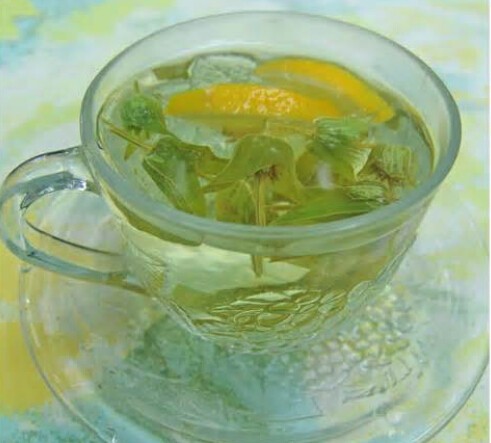
21. Sage Tea
Sage is an aromatic herb with a savory, slightly peppery flavor. It’s often used to season meats and poultry, but it also makes a delicious and healthy herbal tea. Sage contains compounds that may help improve brain function and reduce inflammation.
To make sage tea, steep 1-2 teaspoons of dried sage leaves in hot water for 5-10 minutes. You can also add fresh sage leaves to your favorite tea blend for an extra flavor and health boost. Sage tea is naturally caffeine-free and has a pleasant, slightly sweet taste.
22. Cardamom Tea
Cardamom is a fragrant spice that’s commonly used in Indian and Middle Eastern cuisine. It has a warm, slightly sweet flavor and is often used to add depth and complexity to curries, baked goods, and beverages. However, Some studies suggest that cardamom tea may have potential benefits for weight loss.
To make cardamom tea, crush 2-3 cardamom pods and steep in hot water for 5-10 minutes. You can also add cardamom to black tea or coffee for a spicy, aromatic twist. Cardamom tea is naturally caffeine-free and has a soothing, warming effect on the body.
23. Lavender Tea
Lavender is a fragrant herb that’s known for its calming and relaxing properties. It’s often used in aromatherapy to reduce stress and promote better sleep. But lavender tea may also have benefits for weight loss.
Lavender can help reduce anxiety and depression, which can contribute to emotional eating and weight gain. In addition, Lavender tea may also help improve sleep quality.
To make lavender tea, steep 1-2 teaspoons of dried lavender buds in hot water for 5-10 minutes. You can also add lavender to other teas like chamomile or green tea for an extra calming effect. Lavender tea is naturally caffeine-free and has a delicate, floral flavor.
24. Rosehip Tea
Rosehips are the fruit of the rose plant and are known for their high vitamin C content. They have a tart, slightly sweet flavor and are often used to make jams, syrups, and teas. Rosehip tea is a good source of antioxidants and may have anti-inflammatory effects. Some studies also suggest that rosehip tea may have potential benefits for weight loss.
To make rosehip tea, steep 1-2 teaspoons of dried rosehips in hot water for 10-15 minutes. You can also find rosehip tea bags at many health food stores. Rosehip tea is naturally caffeine-free and has a slightly tart, fruity flavor.
In conclusion
incorporating these detox slimming teas into your daily routine can be a beneficial way to support your weight loss goals and help you slim down fast. While detox teas can support your weight loss efforts, they work best as part of an overall healthy lifestyle. Be sure to eat a balanced diet, exercise regularly, and get enough sleep in addition to detox tea.
In addition, to get the most out of your detox tea, choose high-quality, loose-leaf varieties and steep them properly. So, why not explore the world of detox teas and find the perfect blend to support your weight loss journey?






